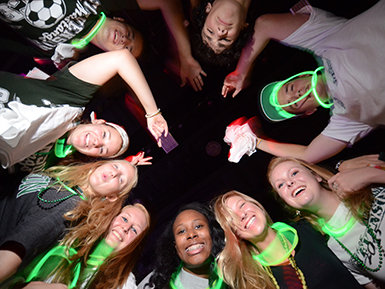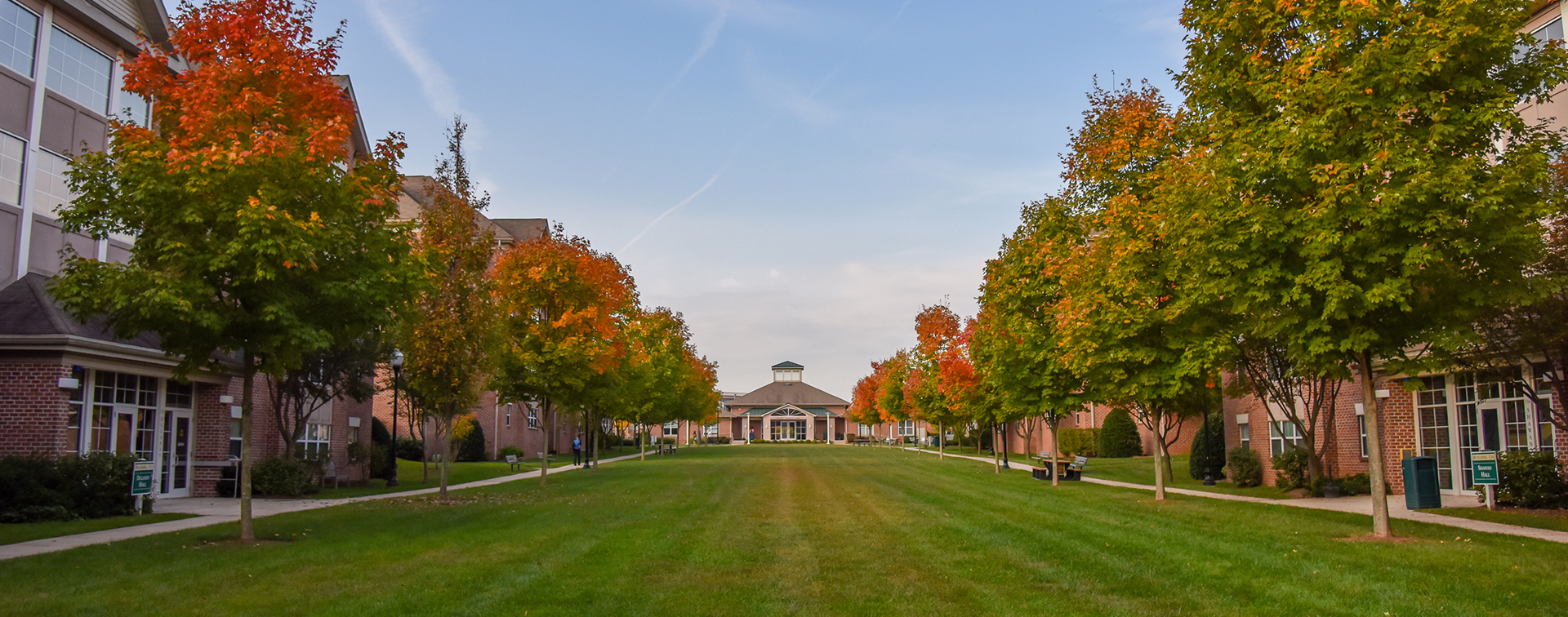Quick Exit to Stevenson Homepage
What To Do If You’ve Been Assaulted
If you are in crisis, call 911 or Campus Safety (443-352-4500)
Report the assault to Campus Safety (443-352-4500) and/or call 911.
The victim will be advised of her/his right to file a complaint with the police and to seek a Protective/Peace Order from the local court. The Director of Campus Safety or the Campus Safety Shift Supervisor can assist in contacting the police or pursuing a Peace Order. Filing a report with Stevenson does not prevent filing a police report or seeking a Peace Order.
If there has been a sexual assault, removal of clothes or bathing or cleaning up in any way may destroy essential evidence. Therefore, to preserve evidence, the victim should not shower, bathe, go to the bathroom, douche, smoke, eat, drink or brush teeth or hair, or change clothes or bedding before going to the hospital or medical facility. Save all clothing worn at the time of the assault; if the victim has changed clothes, do not wash them and bring them to the hospital or medical facility. Do not disturb anything in the area where the assault occurred.
Write down as much as can be remembered about the circumstances of the assault, including a physical description of the assailant. If the alleged perpetrator was unknown to the victim, try to remember any helpful details that may lead to his or her identification, such as scars or other marks, jewelry, dress, language, approximate height and weight in comparison to that of the victim, vehicle description, and tag number. Write these down as soon as possible, and include the date and time of writing.
Victims may receive care at a local hospital, urgent care facility, or through their personal physician, and can obtain a free exam to preserve forensic evidence.
1. Medical Care. Students may also seek medical care—and make confidential reports—at the Stevenson University Wellness Center (443-352-4200; /student-life/health-wellness/). The Wellness Center is open Monday through Friday, 9:00 a.m. – 5:00 p.m. A nurse practitioner or physician will conduct an examination for physical injuries, discuss emergency contraception, and test for STIs. No fees will be charged by the Wellness Center. The Wellness Center will not perform a forensic examination or evidence collection. When a complainant makes a report of sexual misconduct to a doctor, nurse or counselor in the Wellness Center, the report is kept confidential and will not be disclosed unless directed otherwise.
2. Sexual Assault Forensic Exam. If there has been a sexual assault, the victim is strongly encouraged to immediately get a free Sexual Assault Forensic Exam (S.A.F.E.) at the Greater Baltimore Medical Center in Towson (6701 North Charles Street, Towson, Maryland 21204, 443-849-3323 or after business hours 443-849-2225; https://www.gbmc.org/safe) or another similar facility. Campus Safety will coordinate transportation to the hospital for the S.A.F.E. examination, if requested. In addition, the Greater Baltimore Medical Center’s S.A.F.E. program provides free cab vouchers to and from their hospital. Please contact Campus Safety at 443-352-4500 or the Wellness Center at 443-352-4200 to obtain a voucher. Even if the victim is undecided whether to make a police report, evidence may still be collected in a S.A.F.E. examination, and it will be held under an anonymous name for at least 20 years, giving the victim an opportunity to decide.
Mental Health Counselors and Health Care Professionals located in the Stevenson University Wellness Center (443-352-4200) are available during business hours to provide confidential counseling and support to student victims and can assist them in evaluating the options available. After normal business hours, students may contact the 24/7 FoneMed hotline at 800-245-4691. Employees seeking short-term counseling may contact Business Health Services, the University’s Employee Assistance Program, at 1-800-327-2251.
Crisis counseling is also available from TurnAround, Inc., (https://turnaroundinc.org/, 443-279-0379) which provides counseling and support services to victims of domestic violence and sexual assault. Legal assistance and victim advocacy services may also be accessed by contacting the Sexual Assault Legal Institute (SALI) which is a program of the Maryland Coalition Against Sexual Assault (MCASA; https://mcasa.org/ or 301-565-2277).
A person who believes they are a victim of sexual violence may also contact law enforcement authorities and decide whether to file a criminal complaint. Law enforcement may be contacted by dialing 911 and an officer from the appropriate jurisdiction will respond and take a report detailing the circumstances of your allegation. Campus Safety will provide help to a victim in making this contact with law enforcement authorities if requested by the victim. The victim also has the right not to report the incident to criminal authorities. A law enforcement inquiry does not alter Stevenson’s obligation or commitment to conducting a prompt investigation. While Stevenson may temporarily delay its investigation while law enforcement authorities investigate, that investigation is a separate process. However, Stevenson will not wait until the outcome of a criminal proceeding to undertake an investigation and make a decision on the complaint. Stevenson will take appropriate interim steps during the law enforcement agency’s investigation to provide for the safety of the victim(s) and the school community.
Sexual Misconduct Reporting OptionsYou may submit a report or ask questions by contacting one of the following options. Reports made to Campus Safety and other SU employees are expected to be shared with the Title IX Coordinator. Reports made to the Wellness Center and Turnaround are confidential and will not be shared with the Title IX Coordinator without your permission. | |
| Submit an Online Report | |
| Title IX Coordinator Dave Jordan 443-334-2176 dcjordan@stevenson.edu | Campus Safety 443-352-4500 |
| Wellness Center 443-352-4200 | Turnaround, Inc. 443-279-0379 |
| What Happens When I Submit a Report? | |
Stevenson University believes that members of the Stevenson University community have the right to be free from acts of sexual harassment, sexual assault, domestic and/or dating violence, and stalking. The University is committed to providing a safe and non-discriminatory learning and working environment. Accordingly, by this Policy, all members of the Stevenson community and all visitors, regardless of sex, gender, sexual orientation, gender identity, or gender expression are advised that any sexual harassment by any student, employee, or third party is prohibited. Any attempt to commit sexual harassment as defined by this policy, or to assist or willfully encourage any such act, is a violation of this Policy. Sexual harassment is contrary to the basic values of Stevenson, which include promoting a sense of community, fostering learning, instilling integrity, and achieving excellence. Stevenson is committed to providing prompt and equitable resolution of all complaints of sexual harassment.
Violations of this policy may result in disciplinary action up to and including removal from the University for students and termination of employment for faculty and staff.
While you can never completely protect yourself from sexual assault, there are some things you can do to help reduce your risk of being assaulted in social situations.
In a Social Situation
- When you go to a social gathering, go with a group of friends. Arrive together, check in with each other throughout the evening, and leave together. Knowing where you are and who is around you may help you to find a way out of a bad situation.
- Trust your instincts. If you feel unsafe in any situation, go with your gut. If you see something suspicious, contact law enforcement immediately (local authorities can be reached by calling 911).
- Don’t leave your drink unattended while talking, dancing, using the restroom, or making a phone call. If you’ve left your drink alone, just get a new one.
- Don’t accept drinks from people you don’t know or trust. If you choose to accept a drink, go with the person to the bar to order it, watch it being poured, and carry it yourself. At parties, don’t drink from the punch bowls or other large, common open containers.
- Watch out for your friends, and vice versa. If a friend seems out of it, is way too intoxicated for the amount of alcohol they’ve had, or is acting out of character, get him or her to a safe place immediately.
- If you suspect you or a friend has been drugged, contact law enforcement immediately (local authorities can be reached by calling 911). Be explicit with doctors so they can give you the correct tests (you will need a urine test and possibly others).
Avoiding Dangerous Situations
- Be aware of your surroundings. Knowing where you are and who is around you may help you to find a way to get out of a bad situation.
- Try to avoid isolated areas. It is more difficult to get help if no one is around.
- Walk with purpose. Even if you don’t know where you are going, act like you do.
- Trust your instincts. If a situation or location feels unsafe or uncomfortable, it probably isn’t the best place to be.
- Try not to load yourself down with packages or bags as this can make you appear more vulnerable.
- Make sure your cell phone is with you and charged and that you have cab money.
- Don’t allow yourself to be isolated with someone you don’t trust or someone you don’t know.
- Avoid putting music headphones in both ears so that you can be more aware of your surroundings, especially if you are walking alone.
Safety Planning on a College Campus
Traveling around campus
Walking
- Make sure your cell phone is easily accessible and fully charged
- Be familiar with where emergency phones are installed on the campus
- Be aware of open buildings where you can use a phone
- Keep some change accessible just in case you need to use a pay phone
- Take major, public paths rather than less populated shortcuts
- Avoid dimly lit places and talk to campus services if lights need to be installed in an area
- Avoid putting music headphones in both ears so that you can be more aware of your surroundings, especially if you are walking alone.
- Walking back from the library very late at night is sometimes unavoidable, so try to walk with a friend
- Carry a noisemaker (like a whistle) on your keychain
- Carry a small flashlight on your keychain
- If walking feels unsafe, call campus safe escort 443-352-4500.
Driving
- Keep your doors locked
- Have extra car necessities (oil, jumper cables, etc.)
- Try not to wait until the last minute to fill your gas tank; always keep it at least half full if you can
- Have your keys ready when you go to unlock your car
Taking the bus
- Be alert at bus stops when waiting for the bus to arrive
- Use the bus schedule to avoid waiting for a long time at a stop
- Plan your route to use the busiest, best-lighted stop possible
- If someone is bothering you on the bus, tell the driver
- If you feel uneasy about getting off at your usual stop, stay on the bus until the next stop or wait until the bus goes around to your usual stop the second time
Residential Safety
- Lock your door when you go to sleep and when you are not in the room
- Keep your window locked (especially if it is easy to enter from the ground)
- If people constantly prop open the main resident door, talk to an authority about it
- If you are riding the residential elevator, try to stay near the button dashboard so that you have easy access to the emergency button. Also, if you feel threatened, you can push the button for the next floor and leave immediately instead of waiting for the elevator to reach the floor where you live
- Avoid isolated areas (stairways, laundry rooms, basement, etc.) when you are alone
If Someone is Pressuring You
- Remember that being in this situation is not your fault. You did not do anything wrong, it is the person who is making you uncomfortable that is to blame.
- Be true to yourself. Don’t feel obligated to do anything you don’t want to do. “I don’t want to” is always a good enough reason. Do what feels right to you and what you are comfortable with.
- Have a code word with your friends or family so that if you don’t feel comfortable you can call them and communicate your discomfort without the person you are with knowing. Your friends or family can then come to get you or make up an excuse for you to leave.
- Lie. If you don’t want to hurt the person’s feelings it is better to lie and make up a reason to leave than to stay and be uncomfortable, scared, or worse. Some excuses you could use are: needing to take care of a friend or family member, not feeling well, having somewhere else that you need to be, etc.
- Try to think of an escape route. How would you try to get out of the room? Where are the doors? Windows? Are there people around who might be able to help you? Is there an emergency phone nearby?
- If you and/or the other person have been drinking, you can say that you would rather wait until you both have your full judgment before doing anything you may regret later.
What Can You Do as a Bystander?
While individuals of both genders are perpetrators of sexual assault, the majority of those who commit sexual assaults are men. Even so, it is important to remember that the vast majority of men are not rapists. There are many things men (and women) can do to help prevent sexual violence.
If you see someone in danger of being assaulted:
- Step in and offer assistance. Ask if the person needs help. NOTE: Before stepping in, make sure to evaluate the risk. If it means putting yourself in danger, call 911 instead.
- Don’t leave. If you remain at the scene and are a witness, the perpetrator is less likely to do anything.
- If you know the perpetrator, tell him or her that you do not approve of what s/he is doing. Ask him or her to leave the potential victim alone.
Be an ally:
- When you go to a party, go with a group of friends. Arrive together, check in with each other frequently and leave together.
- Have a buddy system. Don’t be afraid to let a friend know if you are worried about her/his safety.
- If you see someone who is intoxicated, offer to call him or her a cab.
If someone you know has been assaulted:
- Listen. Be there. Don’t be judgmental.
- Be patient. Remember, it will take your friend some time to deal with the crime.
- Help to empower your friend or family member. Sexual assault is a crime that takes away an individual’s power, it is important not to compound this experience by putting pressure on your friend or family member to do things that he or she is not ready to do yet.
- Encourage your friend to call campus safety at 443-352-4500.
- Let your friend know that confidential professional help is available through the Wellness Center at 443-352-4200.
- Encourage your friend to report the assault to law enforcement (call 911). If your friend has questions about the criminal justice process, talking with someone on the National Sexual Assault Hotline, 1-800-656-HOPE can help.
- Encourage your friend to call TurnAround, Inc., a Baltimore County sexual assault and domestic violence service. They can reach their 24-hour hotline at 410-828-6390.
If your friend is willing to seek medical attention or report the assault, offer to accompany them wherever they need to go (hospital, police station, campus safety, etc.)
- Encourage him or her to contact one of the hotlines, but realize that only your friend can make the decision to get help.
Computer Safety
- Find a Safe Computer – Please take a moment to think about whether your computer is safe. This is particularly important if the person abusing you may have access to your computer.
- Edit Privacy Settings on Facebook – Review steps you can take to manage your personal information on Facebook.
- Edit Privacy Settings on Twitter – Review steps you can take to manage your personal information on Twitter.
- Clear History/Cache on Mobile Devices – Quick steps to clear your browsing history on iPhone and Blackberry mobile devices.
- Clear History/Cache on Firefox for PC – Quick steps to clear your browsing history on Firefox (for PC).
- Clear History/Cache on Firefox for Mac – Quick steps to clear your browsing history on Firefox (for Mac).
- Clear History/Cache on Internet Explorer – Quick steps to clear your browsing history on Internet Explorer.
- Clear History/Cache on Safari – Quick steps to clear your browsing history on Safari
Immediately after an assault, the victim is strongly encouraged to do the following:
Report the assault to Campus Safety (443-352-4500) and/or call 911.
The victim will be advised of her/his right to file a complaint with the police and to seek a Protective/Peace Order from the local court. The Director of Campus Safety or the Campus Safety Shift Supervisor can assist in contacting the police or pursuing a Peace Order. Filing a report with Stevenson does not prevent filing a police report or seeking a Peace Order.
If there has been a sexual assault, removal of clothes or bathing or cleaning up in any way may destroy essential evidence. Therefore, to preserve evidence, the victim should not shower, bathe, go to the bathroom, douche, smoke, eat, drink or brush teeth or hair, or change clothes or bedding before going to the hospital or medical facility. Save all clothing worn at the time of the assault; if the victim has changed clothes, do not wash them and bring them to the hospital or medical facility. Do not disturb anything in the area where the assault occurred.
Write down as much as can be remembered about the circumstances of the assault, including a physical description of the assailant. If the alleged perpetrator was unknown to the victim, try to remember any helpful details that may lead to his or her identification, such as scars or other marks, jewelry, dress, language, approximate height and weight in comparison to that of the victim, vehicle description, and tag number. Write these down as soon as possible, and include the date and time of writing.
Victims may receive care at a local hospital, urgent care facility, or through their personal physician, and can obtain a free exam to preserve forensic evidence.
1. Medical Care. Students may also seek medical care—and make confidential reports—at the Stevenson University Wellness Center (443-352-4200; /student-life/health-wellness/). The Wellness Center is open Monday through Friday, 9:00 a.m. – 5:00 p.m. A nurse practitioner or physician will conduct an examination for physical injuries, discuss emergency contraception, and test for STIs. No fees will be charged by the Wellness Center. The Wellness Center will not perform a forensic examination or evidence collection. When a complainant makes a report of sexual misconduct to a doctor, nurse or counselor in the Wellness Center, the report is kept confidential and will not be disclosed unless directed otherwise.
2. Sexual Assault Forensic Exam. If there has been a sexual assault, the victim is strongly encouraged to immediately get a free Sexual Assault Forensic Exam (S.A.F.E.) at the Greater Baltimore Medical Center in Towson (6701 North Charles Street, Towson, Maryland 21204, 443-849-3323 or after business hours 443-849-2225; https://www.gbmc.org/safe) or another similar facility. Campus Safety will coordinate transportation to the hospital for the S.A.F.E. examination, if requested. In addition, the Greater Baltimore Medical Center’s S.A.F.E. program provides free cab vouchers to and from their hospital. Please contact Campus Safety at 443-352-4500 or the Wellness Center at 443-352-4200 to obtain a voucher. Even if the victim is undecided whether to make a police report, evidence may still be collected in a S.A.F.E. examination, and it will be held under an anonymous name for at least 20 years, giving the victim an opportunity to decide.
Mental Health Counselors and Health Care Professionals located in the Stevenson University Wellness Center (443-352-4200) are available during business hours to provide confidential counseling and support to student victims and can assist them in evaluating the options available. After normal business hours, students may contact the 24/7 FoneMed hotline at 800-245-4691. Employees seeking short-term counseling may contact Business Health Services, the University’s Employee Assistance Program, at 1-800-327-2251.
Crisis counseling is also available from TurnAround, Inc., (https://turnaroundinc.org/, 443-279-0379) which provides counseling and support services to victims of domestic violence and sexual assault. Legal assistance and victim advocacy services may also be accessed by contacting the Sexual Assault Legal Institute (SALI) which is a program of the Maryland Coalition Against Sexual Assault (MCASA; https://mcasa.org/ or 301-565-2277).
A person who believes they are a victim of sexual violence may also contact law enforcement authorities and decide whether to file a criminal complaint. Law enforcement may be contacted by dialing 911 and an officer from the appropriate jurisdiction will respond and take a report detailing the circumstances of your allegation. Campus Safety will provide help to a victim in making this contact with law enforcement authorities if requested by the victim. The victim also has the right not to report the incident to criminal authorities. A law enforcement inquiry does not alter Stevenson’s obligation or commitment to conducting a prompt investigation. While Stevenson may temporarily delay its investigation while law enforcement authorities investigate, that investigation is a separate process. However, Stevenson will not wait until the outcome of a criminal proceeding to undertake an investigation and make a decision on the complaint. Stevenson will take appropriate interim steps during the law enforcement agency’s investigation to provide for the safety of the victim(s) and the school community.
Vision
University aspires to create a culture free of gender-based violence of any kind, specifically sexual assault, dating/domestic violence, and stalking.
Mission
Stevenson University aims to empower every member of the campus community in eradicating gender-based violence through innovative prevention and intervention strategies that raise awareness of sexual assault, dating/domestic violence, and stalking.
As steadfast members of the Coordinated Community Response Team (CCRT), we commit to the following core values as critical in our ability to accomplish that mission:
Values
- Integrity
The CCRT respects those we serve and each other in a way that recognizes the inherent dignity and honesty of all people. We respect the privacy of our students, faculty, staff and visitors alike, accessing and discussing only that information required to provide quality services and, as appropriate, maintain confidentiality. - Community
The CCRT values providing exemplary services to students, faculty and staff and visitors alike, while respecting individual and cultural differences. - Learning
The CCRT values expanding the knowledge of our students, faculty and staff through collaborative trainings on prevention and intervention strategies that are culturally relevant and inclusive of historically marginalized or underrepresented groups. - Excellence
The CCRT lauds superior performance while recognizing the importance of persistence toward goals.
Members
Committee Chair
Dave Jordan
Title IX Coordinator
Human Resources
Committee Members
Steve Gossage Linda Reymann Brett C. Adams Margaret Baldwin Jeff Kelly | Kathleen A. Railey Kimberly McManus Cristina Garcia Jenna Womack Andre Williams Student Representative |
What Can You Do?
Believe your friend. Tell your friend you believe them and you want to support them in any way you can. Do not judge your friend, regardless of the circumstances.
Be a good listener. If you hear your own voice more than your friend’s, you’re talking too much and not listening enough. Listen non-judgmentally to what your friend is saying and hear the experience as your friend describes it. You may want to ask questions and get details about what happened, but remember your role is to support your friend, and it is best to allow them to decide what and how much they would like to tell you about the incident.
Validate your friend’s feelings. Be empathetic, but do not let your own emotions get in the way of supporting your friend. It is not uncommon to feel intense anger toward the person who did this but what your friend needs right now is calm and caring support. Expressing your own emotions only adds to the emotional burden your friend is already carrying. Keep the focus on your friend”’s emotional and physical well-being.
Know that each experience is unique. If you’ve had other friends who experienced a sexual assault, avoid making comparisons.
Assure your friend that it is not their fault. Self-blame is common among victims of sexual violence. It is important that, as their friend, you help the survivor understand that no matter what happened-it was not their fault.
Do not make judgmental comments. Do not comment on what could have been done differently or make statements that imply your friend could have avoided the assault.
Discuss their options with them. Show them the sexual harassment and sexual misconduct policy. Don’t feel as though you have to have all the answers. That is not your role. Instead, help your friend to find out the answers by reaching out to university resource personnel.
Give your friend control. Let them choose the next steps. You may provide advice, guidance, and information about their options, but allow your friend to decide if, when, and how they will pursue these resources.
Offer continued support. If your friend is hesitant to get help, offer to accompany them in seeking medical attention, counseling, and going to the police or to university resource personnel. Sometimes that’s all it takes to help a friend begin to take action. Recognize that your friend’s needs may change over time, so keep “checking in” to renew your offer of help and support.
Respect privacy and confidentiality. Do not share your friend’s story with other people unless you have their permission to do so. At the same time, never hesitate to seek advice from individuals who are in a position to help you. It is not necessary to give names or provide details to get initial support and to learn more about options.
Do not forget to support yourself. Supporting a friend through a trauma can be a difficult and emotionally draining experience for those in the support role as well. Recognize this and don’t hesitate to seek help and support for yourself.
- Grand River Solutions-Trauma Informed Conduct Process
- ATIXA- The New Regulations
- Safe Colleges- New Title IX Regulations
- United Educators- Unpacking the Final Title IX Regulations
- MCASA- Supporting Survivors During COVID 19
- CUPA – Title IX Final Rule
- Saul Ewing (law firm)- Title IX Regulations
- ATIXA- Violence Risk Assessment
- Child Sexual Abuse Training
- Sexual Assault Crisis Intervention for Advocates
- The Neurobiology of Trauma and MD’s Sexual Assault Kit Initiative
- SALI 101
- Confidentiality and Safety Planning for Advocates
- Serving Survivors from Underserved Populations
- Juvenile Offenders
- Economic Costs of Sexual Violence
- Role of SART & SAFE Exams
- Advanced Title IX Coordinator Training
- How the Updated Title IX Regulations Have Impacted Employment Issues
Resources
Sexual Harassment Title IX Policy.
On-Campus and Off-Campus Resources
College Parents Matter
(Resources for Parents)






